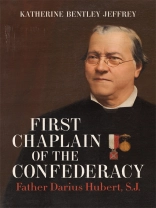Darius Hubert (1823‒1893), a French-born Jesuit, made his home in Louisiana in the 1840s and served churches and schools in Grand Coteau, Baton Rouge, and New Orleans. In 1861, he pronounced a blessing at the Louisiana Secession Convention and became the first chaplain of any denomination appointed to Confederate service. Hubert served with the First Louisiana Infantry in Robert E. Lee’s Army of Northern Virginia for the entirety of the war, afterward returning to New Orleans, w...
Darius Hubert (1823‒1893), a French-born Jesuit, made his home in Louisiana in the 1840s and served churches and schools in Grand Coteau, Baton Rouge, and New Orleans. In 1861, he pronounced a blessing at the Louisiana Secession Convention and became the first chaplain of any denomination appointed to Confederate service. Hubert served with the First Louisiana Infantry in Robert E. Lee’s Army of Northern Virginia for the entirety of the war, afterward returning to New Orleans, where he continued his ministry among veterans as a trusted pastor and comrade. One of just three full-time Catholic chaplains in Lee’s army, only Hubert returned permanently to the South after surrender. In postwar New Orleans, he was unanimously elected chaplain of the veterans of the eastern campaign and became well-known for his eloquent public prayers at memorial events, funerals of prominent figures such as Jefferson Davis, and dedications of Confederate monuments.
In this first-ever biography of Hubert, Katherine Bentley Jeffrey offers a far-reaching account of his extraordinary life. Born in revolutionary France, Hubert entered the Society of Jesus as a young man and left his homeland with fellow Jesuits to join the New Orleans mission. In antebellum Louisiana, he interacted with slaves and free people of color, felt the effects of anti-Catholic and anti-Jesuit propaganda, experienced disputes and dysfunction with the trustees of his Baton Rouge church, and survived a near-fatal encounter with Know-Nothing vigilantism. As a chaplain with the Army of Northern Virginia, Hubert witnessed harrowing battles and their equally traumatic aftermath in surgeons’ tents and hospitals. After the war, he was a spiritual director, friend, mentor, and intermediary in the fractious and politically divided Crescent City, where he both honored Confederate memory and promoted reconciliation and social harmony. Hubert’s complicated and tumultuous life is notable both for its connection to the most compelling events of the era and its illumination of the complex and unexpected ways religion intersected with politics, war, and war’s repercussions.












